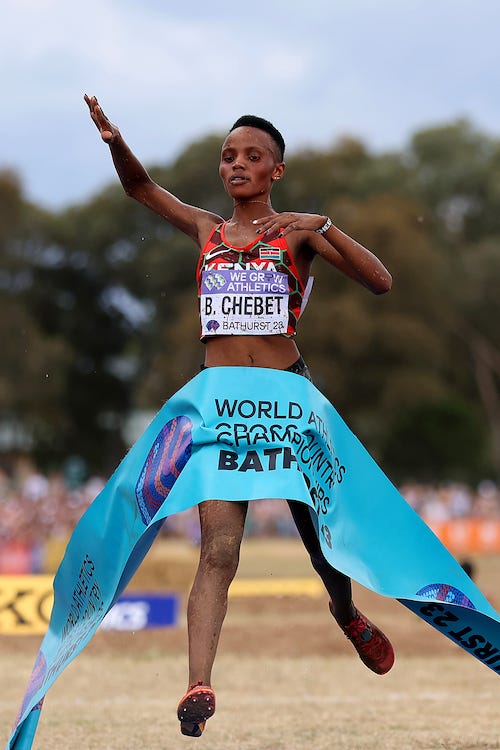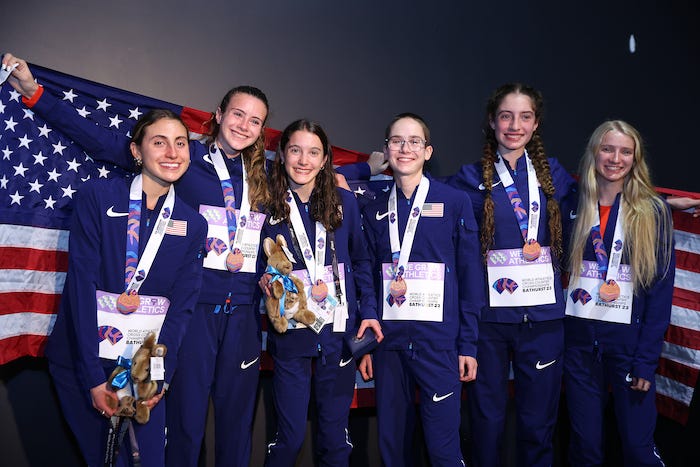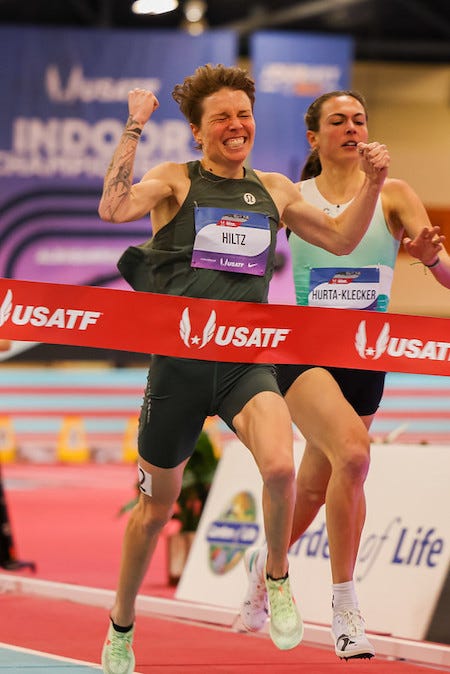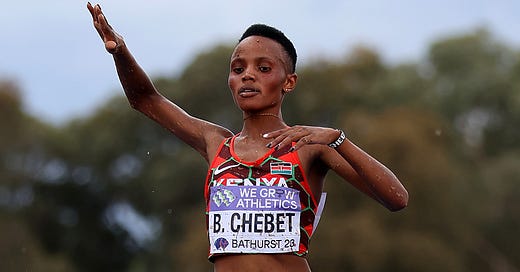Fast Women: Lynn Jennings, Darlene Beckford Pearson expose their abuser
Coach John Babington sexually assaulted them when they were teens. Decades later, they share their stories.
Issue 224, presented by the POC Trail Running & Adventure Retreat in Alaska with Alison Mariella Désir
A story that’s been on my mind for nearly two years broke on Friday, and I have a lot to say about it. Because of that and being on the road on Sunday, the rest of my coverage will be less comprehensive than usual this week.
Survivors of John Babington’s abuse come forward
In December, the U.S. Center for SafeSport ruled that former Wellesley College and Olympic coach John Babington had been banned from coaching. And on Friday, two of the athletes he sexually abused when they were teenagers, Olympic 10,000m bronze medalist Lynn Jennings and former world junior record holder Darlene Beckford Pearson, came forward to tell their stories in a Boston Globe article, written by Bob Hohler. They were joined by Melody Fairchild, who says she escaped Babington’s advances, and an anonymous Wellesley College student, who left the school after unwanted sexual contact with Babington. (All devices/browsers get access to one free Globe article, but if you’ve already used yours and your cache hasn’t been cleared since then, you might hit a paywall.)
It’s coincidental yet fitting that after Jennings’ years-long pursuit of justice, the story broke the weekend of the World Cross Country Championships. Jennings, 62, is also a three-time World Cross Country champion. I was a junior in high school in 1992, when my father took me to watch her win her third consecutive title in a sprint finish on a snowy course in Boston. She was the runner so many of us looked up to at the time, and she was as tough as they come.
Those newer to the sport might not recognize Jennings’ name, because when she retired from competitive running, she mostly chose to leave the public eye. But before there was Deena Kastor or Shalane Flanagan, there was Lynn Jennings.
I met Babington, her longtime coach, in 2008, when we happened to be part of the same trip to Kenya. And late in the summer of 2012, I took a pay cut from my already poorly paying coaching job to become his assistant coach at Wellesley College. Babington knew he would be retiring before too long, and he wanted me to replace him. (Instead, that ended up being the end of my college coaching career, too.)
I coached with Babington, now 77, for only nine months, but during that time, I thought I got to know him pretty well. I enjoyed many aspects of my time at Wellesley, a women’s college 14 miles west of Boston. I wrote recruiting letters that played up Babington’s elite coaching accomplishments. I enjoyed talking to him about the sport. I was quoted saying nice things about him in articles about his retirement. We remained in touch intermittently after he retired. He was very supportive of my career. I was completely in the dark.
I think it was in 2019 that SafeSport reached out to me, saying they wanted to talk to me about someone I had coached with. Babington wasn’t the first or second person who came to mind. And that’s one of the more discouraging things about my college coaching experience. I still don’t know if sexual abuse in coaching is really that prevalent, or if I just had some rough luck in crossing paths with several coaches who preyed on young athletes.
I told SafeSport about my experience with him. There were some eyebrow-raising things (I’m being vague to protect students), but I wasn’t aware of anything that would trigger a SafeSport investigation. If I was, I would have spoken up long ago. The truth was still so far off my radar at that point that I thought the investigation might be a mistake.
It wasn’t until March 2021 that I got a call that led to me learning everything in Friday’s Globe article. I processed the news by going for an early morning rage run on Wellesley’s campus—still closed to the public at the time due to the pandemic—prepared to give anyone who tried to stop me an earful. (Continue reading here.)
Thanks to the POC Trail Running & Adventure Retreat for supporting Fast Women this week!
Activist, author, and community builder Alison Mariella Désir and Run Alaska Trails are joining forces this summer for a retreat specifically for Black, Indigenous, and other people of color. The retreat—the first of its kind in Alaska—will take place August 6–11, and it will center on running the traditional lands of the Alutiiq, Sugpiaq, and Dena’ina people, as well as enjoying the best of the Kenai Peninsula.
BIPOC runners from across the country will spend days on trails and enjoying only-in-Alaska adventures. In the evenings, they’ll connect lakeside with new friends. In addition to trail running, attendees will raft the Kenai, set sail on a private glacier and wildlife cruise, participate in a training session at an Iditarod kennel, and enjoy a variety of water sports on Summit Lake.
Workshops, facilitated conversations, and celebrations will be threaded throughout the itinerary. Désir will lead and facilitate robust discussions on the realities BIPOC runners face, lighting the way toward a more inclusive path forward in fighting white supremacy and racism. More information and registration link here.

With a dramatic finish, Beatrice Chebet wins the World Cross Country title
With less than four minutes remaining in the senior women’s 10K at the World Cross Country Championships in Bathurst, Australia, Ethiopia’s Letesenbet Gidey made her move. Despite the hot and humid conditions, she opened up a comfortable lead and looked like she would cruise to a win. But in the final straightaway, her turnover slowed, and Kenya’s Beatrice Chebet came on strong. With roughly six seconds remaining, Chebet caught Gidey, who stumbled and collapsed. Chebet, 22, flew on to victory, breaking the tape in 33:48. (You can watch a video of the finish here.)
“I didn’t expect to win, but she was slowing,” Chebet said. “I saw my chance, and I decided to kick. I felt she didn’t have any more. I knew she couldn’t threaten me. I knew I had the potential to go on and win. I was still feeling strong. I knew I could do it.”
Gidey, 24, was still on the ground as Ethiopia’s Tsigie Gebreselama and Kenya’s Agnes Jebet Ngetich passed her, and went on to earn silver and bronze, respectively. Gidey’s coach hopped a barrier, rushed onto the race course, and dragged her to her feet. And then she was able to cross the finish line on her own, in fourth. But because of the assistance, she was disqualified.
“Today was a good race with a sad ending for me. Let’s take the good forward to the future,” Gidey wrote in a statement on social media. “I’m doing well. Thank you all for the messages. I’ll be back!” she added in the caption. It was scary to watch her go down, so it’s good to have the reassurance that she is okay.
Kenya continued their win streak in the team competition, topping Ethiopia 16 to 25. (Low score wins in cross country.) Even if Gidey’s fourth-place finish had stood, Ethiopia still would have lost to Kenya by one point. Gidey’s fall affected the team outcome, but her disqualification did not.
Led by Ednah Kurgat (18th) and Weini Kelati (21st), the U.S. women finished fifth as a team.

Senayet Getachew, 17, won the U20 race, covering the 6K course in 20:53 and leading Ethiopia to a team win over Kenya. The U.S. women earned bronze, their first team medal in the history of the event. The four scorers—Ellie Shea (10th), Irene Riggs (12th), Karrie Baloga (13th), and Zariel Macchia (19th) are all in high school.
In the 4 x 2K mixed relay, teams are made up of two women and two men, and each athlete runs one 2K loop. Anchored by Brenda Chebet (not to be confused with Beatrice Chebet, who won the senior women’s race), Kenya won by seven seconds over Ethiopia. And the home team, Australia, had a big run, including a particularly strong second leg by Jess Hull, to earn bronze. The U.S. team that included Heather MacLean and Emma Coburn finished fifth, more than a minute out of the medals. I appreciated that while most people just weaved in and out of the tires stacked on the challenging course, Coburn hurdled them. (World XC results)
I haven’t seen results from the accompanying masters events yet, but I hear that April Lund and Ben Bruce earned silver in the masters 2 x 2K mixed relay.

Constien, Akins, and Hiltz earn titles at the USATF Indoor Championships
All three of the middle-distance and distance events at the USATF Indoor Championships featured dramatic finishes and produced first-time winners. First Val Constien, an unsponsored Olympian, won the 3,000m, edging out Whittni Morgan, 8:48.29 to 8:48.42. The times were quick considering they were racing about 5,000 feet above sea level. The win was Constien’s first national title at any level.
In the 800m, Nia Akins of the Brooks Beasts found a path on the inside in the closing meters and used it to edge out Allie Wilson and Kaela Edwards, winning the race in 2:00.16. Akins was a two-time NCAA runner-up in the 800m and she seemed poised to win a title as a senior in 2020. But those hopes ended abruptly with the pandemic. Now she has a U.S. title. And I loved what she had to say about it.
And Nikki Hiltz won a thrilling 1500m battle against Sage Hurta-Klecker, 4:17.10 to 4:17.26. As far as I know, Hiltz became the first openly non-binary athlete to win a national title in track & field. Thanks to their strong social media presence, Hiltz has become easy to root for, and this felt like a victory for a bigger cause. And it was satisfying that in Hiltz’s big moment, commentators Kara Goucher and Paul Swangard consistently got their pronouns right, which is something most commentators have struggled with up to this point.
In the non-distance events, Anna Hall had a fantastic meet, setting a North American record in the pentathlon with 5004 points. She ran 8.04 seconds in the 60m hurdles; high jumped 6 feet, 3.25 inches; put the shot 45 feet, 3.5 inches; long jumped 20 feet, 9.75 inches; and ran a 2:05.70 800m. Her point total left her an agonizing nine points shy of the world record. And to top it off, Hall won the 400m final two days later, in a PR of 51.03 seconds. It’s only her first year as a pro, but Hall, 21, is poised to become one of the biggest stars in the sport.
In the weight throw, DeAnna Price broke the world best twice, with a best mark of 26.02m (85 feet, 4.25 inches). And in the 60m, Aleia Hobbs set a North American record, running 6.94 seconds. That makes her the second-fastest woman ever behind Irina Privalova, who ran 6.92 seconds in 1993. Spikes published a moving article by Hobbs earlier in the week, in which she discussed adopting her son last summer, which gives her added purpose every time she steps on the track. (USATF Indoor results)
Additional Results
Femke Bol broke the world record in the indoor 400m at the Dutch Indoor Championships, running 49:26!
Arkansas’ Britton Wilson, who is a force in the shorter distances, ran her first-ever 800m on Friday, winning the Arkansas Qualifier in an impressive 2:02.13. (Results) “I think I actually … liked it??” she wrote on Instagram. If she ever decides to focus on the 800m, watch out!
Camille Herron, who announced last week that she has partnered with Lululemon, set new 12-hour and 100-mile world, American, and masters records on the track at the Raven 24 Hour. She covered 93.473 miles in 12 hours (7:42/mile) and ran 100 miles in 12:52:50 (7:44/mile).
It sounds like the Black Canyon 100K was a fantastic race. Keely Henninger won in a course record of 8:45:30, and Heather Jackson, who is new to ultrarunning but not endurance sports, finished second in 8:47:59. Both were under the previous course record. Henninger accepted her golden ticket to compete at the Western States 100, but Jackson already had a spot in the race, so third-place finisher Meghan Morgan (8:53:52), accepted the second golden ticket.
In Barcelona, Kenyans Irine Jepchumba Kimais (1:04:37) and Joyciline Jepkosgei (1:04:46) ran two of the fastest half marathons of all time. And Kenya’s Hellen Obiri won the Ras Al Khaimah Half Marathon in 1:05:05. This link covers both races.
A few podcasts I enjoyed
Joan Benoit Samuelson on I’ll Have Another. I particularly appreciated what she had to say about climate change and setting new goals as we age.
Jereny Rivera, who has gone from running 5:30 in the marathon to hoping to qualify for the Olympic Trials, was a guest on RunChats with @RonRunsNYC. And if you enjoy her story, she was also on The Drop and the Road to the Trials last week.
Olivia Baker on More Than Miles. And a more recent update: Baker said in her Instagram stories last week that she ended her indoor season a little early after tweaking her ankle racing at BU. But she expects to run a full outdoor season.
Something that made me laugh
This video from Laura Green. It’s a good one if you need some help putting your running in perspective. And I regularly think about how weird it is that I put so much energy into following other people’s “runnin’ around.”
Thanks to everyone who keeps Fast Women going with your contributions via Venmo and Patreon. This work would not be possible without you. And make sure to check out Alison Mariella Désir’s POC Trail Running & Adventure Retreat in Alaska.
I hope you all have a good week.
Alison




